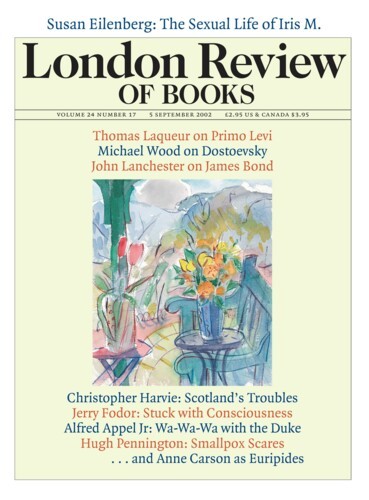A distantish relation of mine, R. Ellis Roberts, was, for a few years from 1928, literary editor of the New Statesman, and a relatively undistinguished one at that. Kingsley Martin described Roberts (in Father Figures, his first volume of autobiography) as the ‘only writer on the NS whose contributions I could not stomach – I found his writing intolerable.’ Clifford Sharp, Martin’s predecessor, wasn’t much of a fan either, even though he appointed Uncle Ellis on double the salary of the previous incumbent, Desmond MacCarthy. Still, Sharp wasn’t one to hold his tongue. As Martin writes in his second volume of autobiography, Editor, Sharp ‘might just have turned the financial corner in the late 1920s if he had not run into heavy legal costs. One or two serious libel actions and the remark that no one could “hope for a fair hearing in a court presided over by Justice Avory” were naturally expensive.’ Among Roberts’s papers in the Bodleian is a letter from Sharp, dated ‘Good Friday’ (probably 1929 or 1930), savage with wit:
Those two sketches . . . both seemed dreadful to me – the most vicious of all forms of child worship enshrined in slovenly language of the most emetic sentimentality . . . followed by a lot of painstaking but washy verse masquerading as poetry . . . I felt I wanted a whole page adv. in the next issue explaining that I have nothing whatever to do with the N.S. nowadays.
‘Some people will like W-[illegible]’ you feel sure. I am sure too. But they are people of whom the Statesman has few amongst its readers & would like to have fewer. It is by way of pruning them out that we occasionally print semi-obscenities.
The spasm of genealogical indignation I felt on first reading this soon passed; with the evidence of Uncle Ellis’s own unpublished poems before me, too, I had to concede Sharp was probably in the right. And the cavalier attitude shown here towards circulation is admirable (that goes for my much maligned great-great uncle, too): you can’t please everyone, and saying what you want often works against shifting the maximum number of copies (or, for that matter, pleasing your editor). Jane Ennis, the editor of Now, has unabashedly gone after as big a readership as possible, admitting in a recent interview: ‘I don’t have any natural interest in celebrities at all . . . I don’t care if my subject is caravans, celebrities or the birth of the sperm whale. I just like to hit the button.’ Not the button marked ‘launch baby whale,’ but the one that makes you sell more copies than OK!, Hello and Heat. Ennis thinks that ‘the celebrity thing is bound to bottom-out’ because ‘too many people are trying to jump onto it.’ When it does, she’ll no doubt head happily off to edit Cetacean Obstetrics Monthly; but what will happen to everyone else recklessly frolicking on the bouncy castle of celebrity without taking off their shoes? What will happen, for example, to Nigel Farndale?
Farndale’s Flirtation, Seduction, Betrayal: Interviews with the Rich and Famous is to be published at the end of October (Constable, £14.99). When an advance proof copy arrived on the Short Cuts desk I eagerly pounced: at last! Everything I ever wanted to know about everyone from Pamela Anderson to Ivana Trump. Imagine my surprise, then, when I opened the book at random only to see the name of Roger Scruton. Confused, I had another look at the cover: ‘FLIRTATION SEDUCTION BETRAYAL’. Big, strong capital letters, solid and reliable. So what was going on? There, in elegant gothic type, lay the answer: ‘The Sunday Telegraph’. Farndale works for the Telegraph. He says he finds that ‘older men’ – by which he means those over forty – ‘make the best subjects,’ which would explain the contents (James Hewitt to Henry Kissinger by way of Geoffrey Boycott, Charlton Heston, Dave Lee Travis and Norman Tebbit), but you have to wonder how much of a coincidence it is that men over forty not only ‘make the best subjects’ but also make the best Telegraph readers. Farndale justifies his title by quoting Andrew Billen, ‘who writes interviews for the Times’: ‘the three stages of a successful interview are flirtation, seduction and betrayal.’ Well, OK, but I still feel cheated. Opening with James Hewitt may be a tacit sop to those of us who like our books to deliver what they promise on the cover. Farndale makes up for (nearly) everything, however, with a terrific anecdote about Truman Capote and Marlon Brando.
CAPOTE: You tell him about yourself, and slowly spin your web so that he tells you everything. That’s how I trapped Marlon.
BRANDO: The little bastard spent half the night telling me his problems. I figured the least I could do was tell him a few of mine.
Clifford Sharp wasn’t very interested in personal celebrity. In his letter to Ellis Roberts – written in a different era, decades before the TLS abandoned anonymity – he said:
I wish there were a placard hanging in your room (instead of one of those foul pictures of yours).
DON’T LET ‘EM SIGN
. . . It’s all this kindness to children over again – how they love . . . to see their bloody little names in print. But it is not good for them – & worse for the paper. It is their business to help make our reputation, not ours to make theirs.
In one respect at least, Uncle Ellis appears to have been ahead of his time; not that knowing that would have done anything to change Sharp’s mind.
Send Letters To:
The Editor
London Review of Books,
28 Little Russell Street
London, WC1A 2HN
letters@lrb.co.uk
Please include name, address, and a telephone number.

